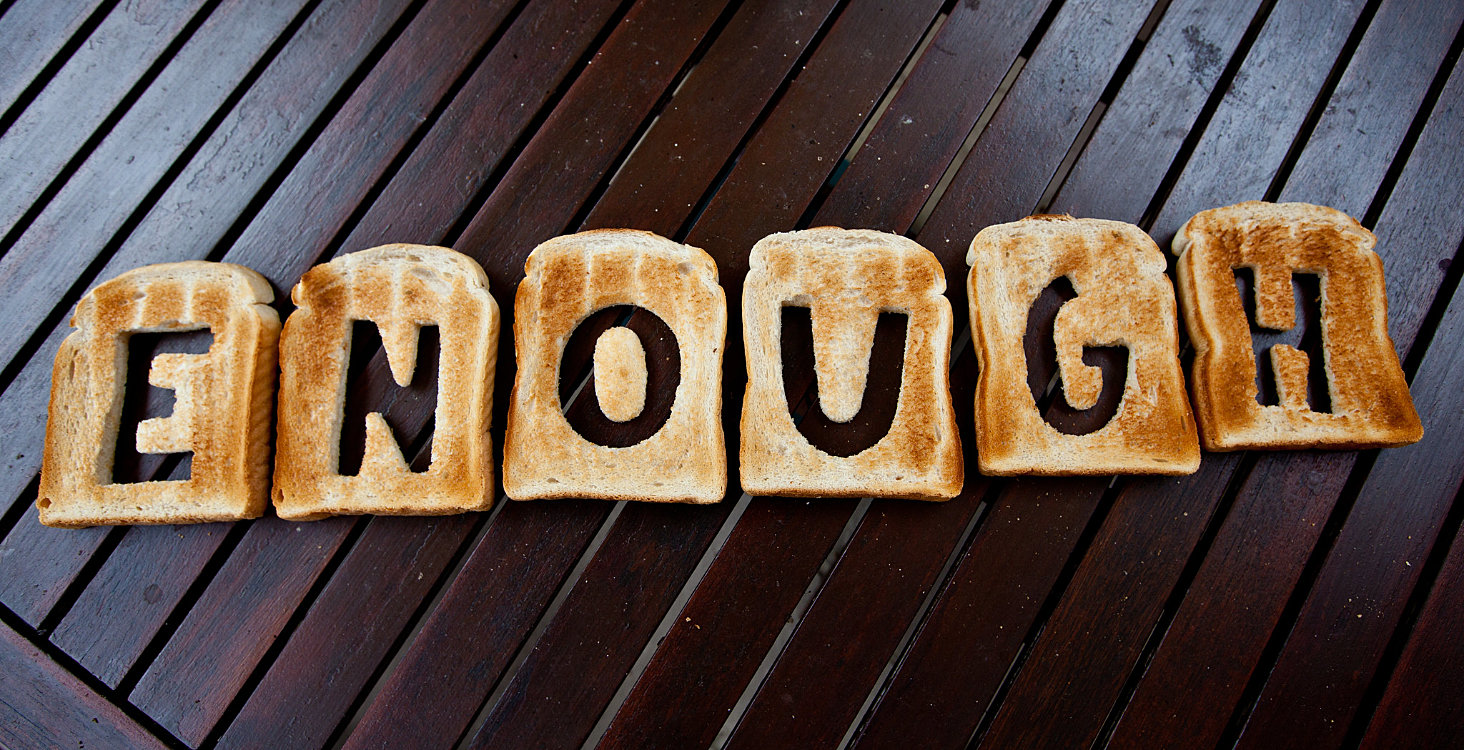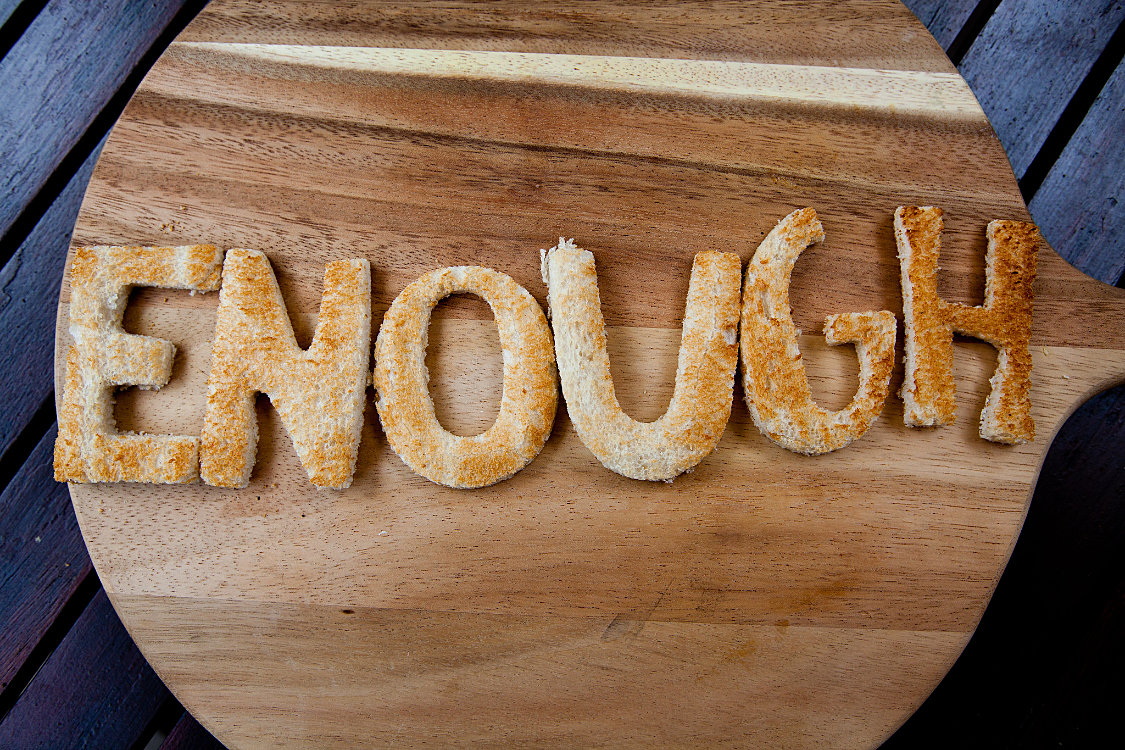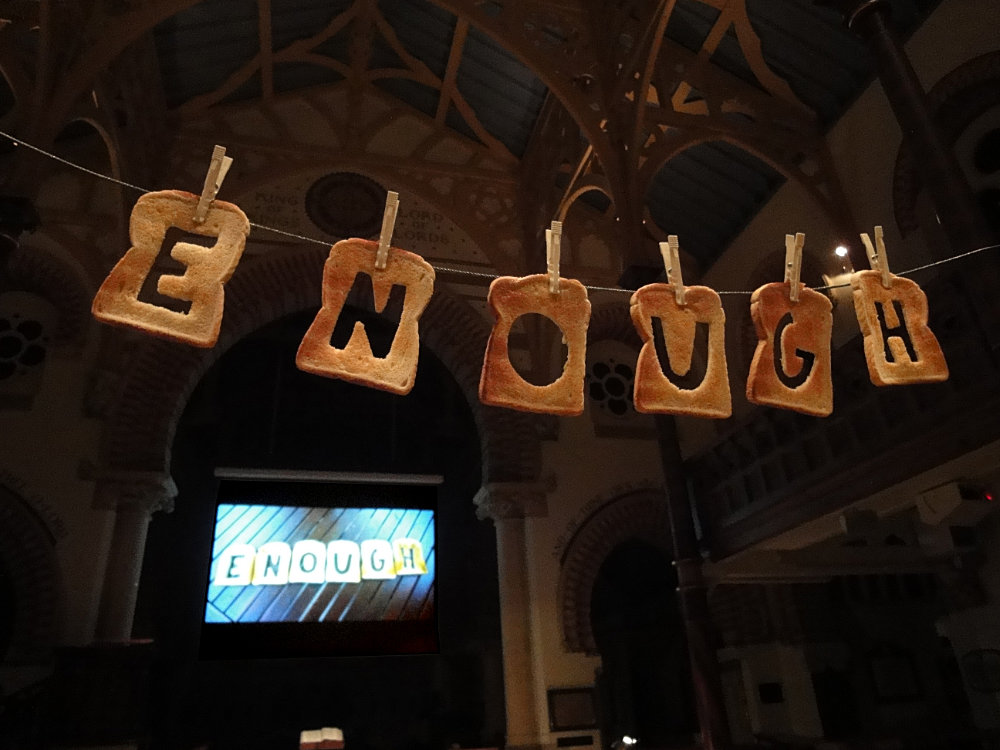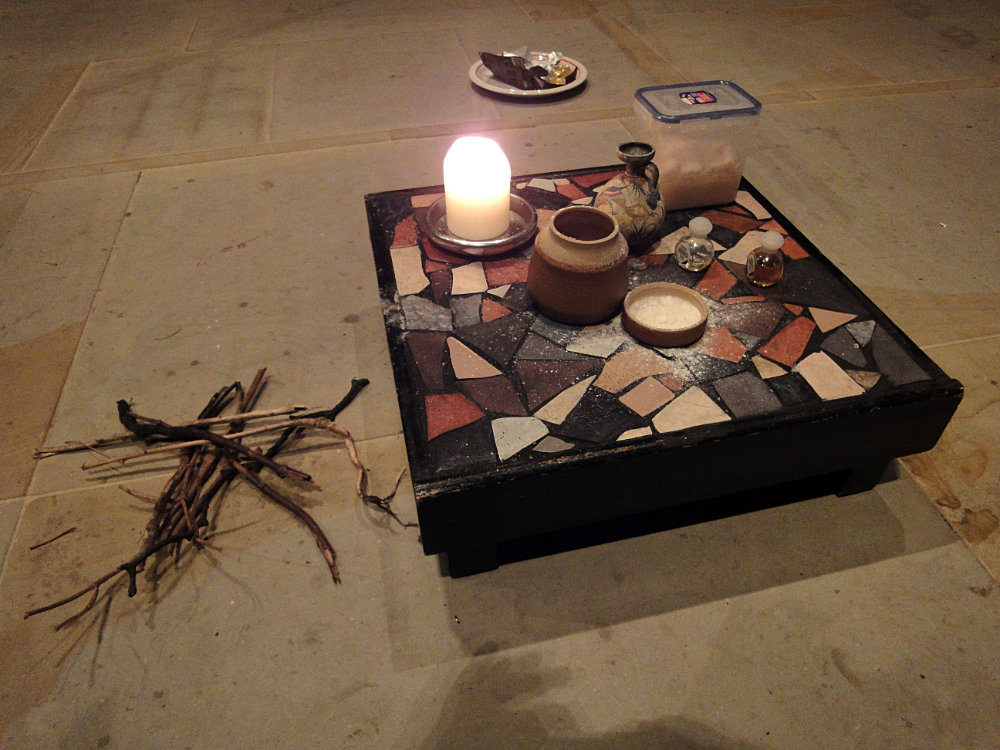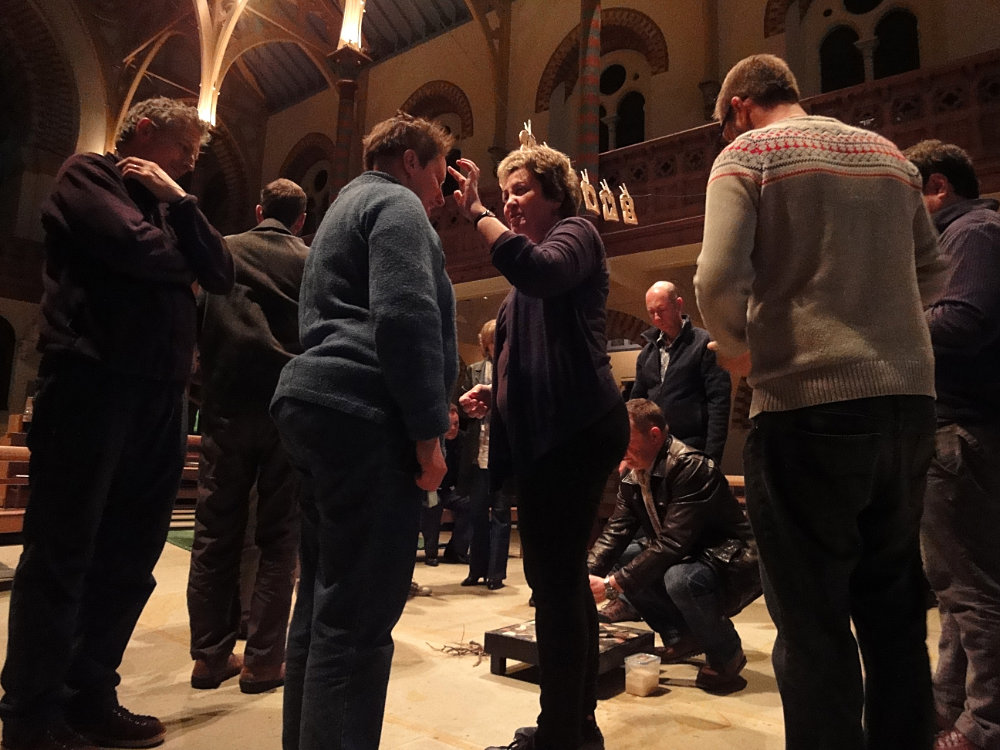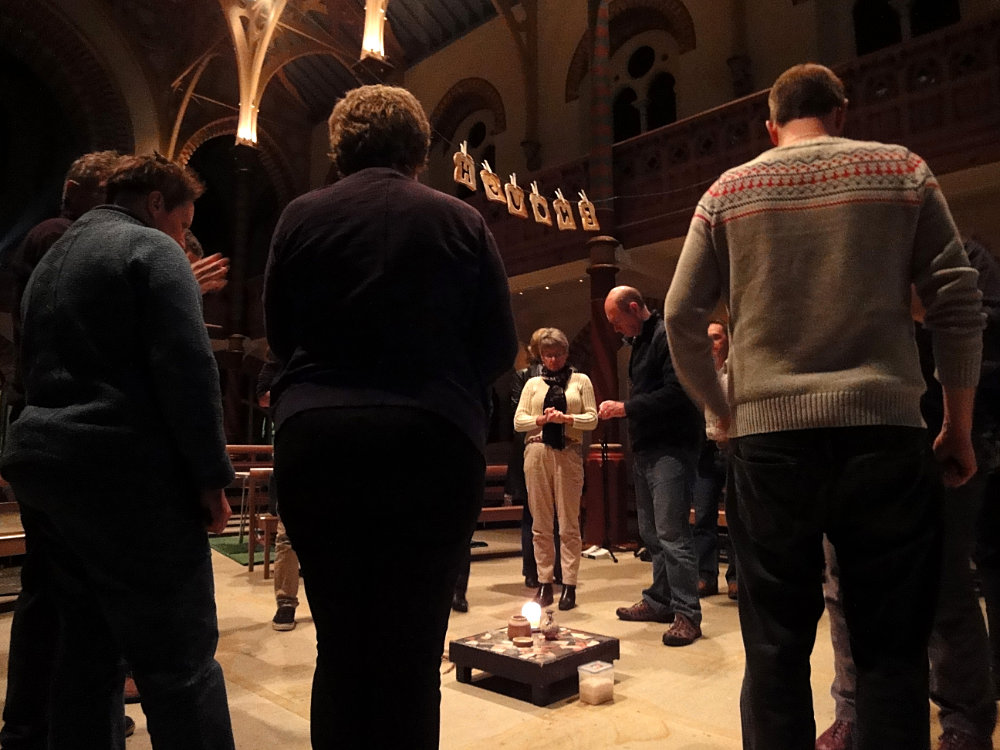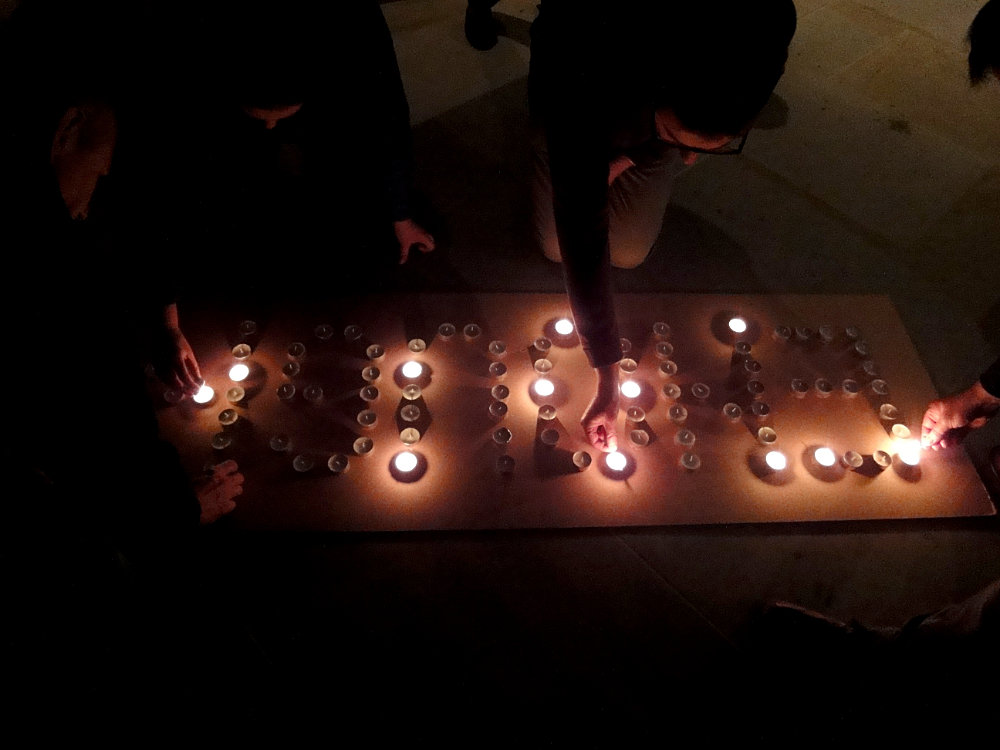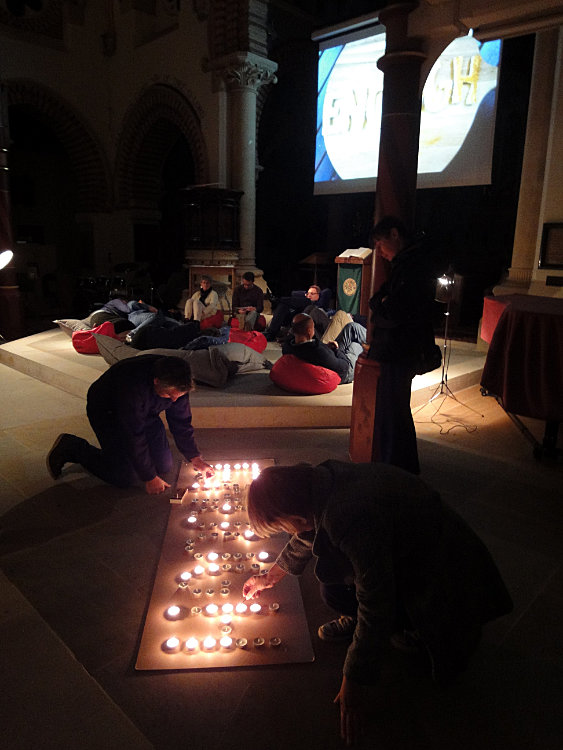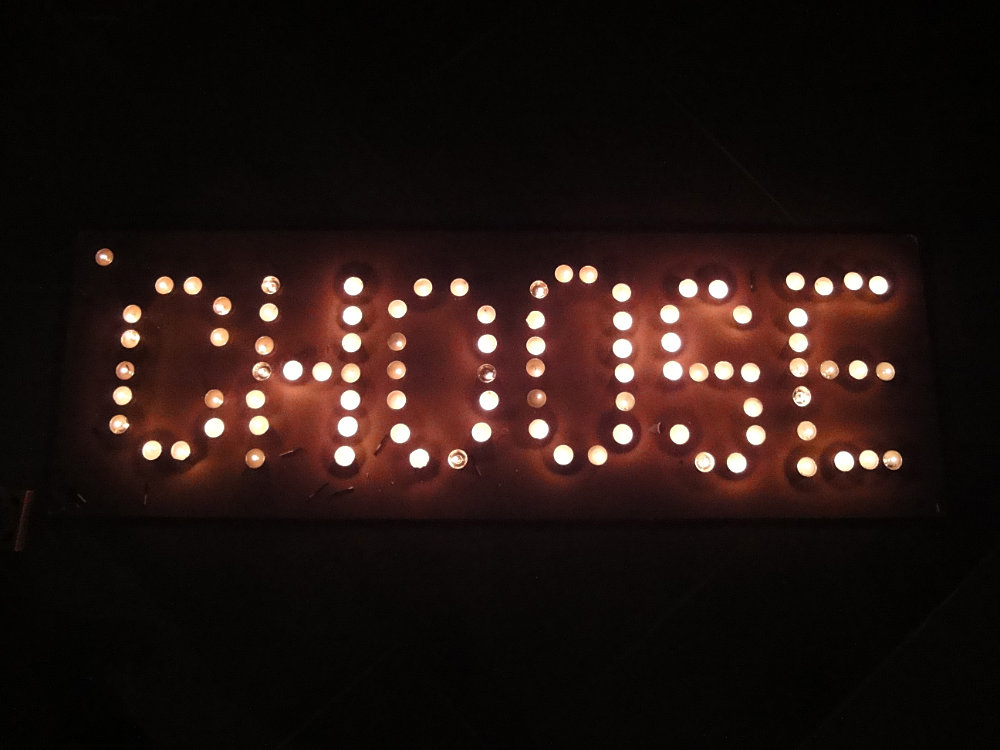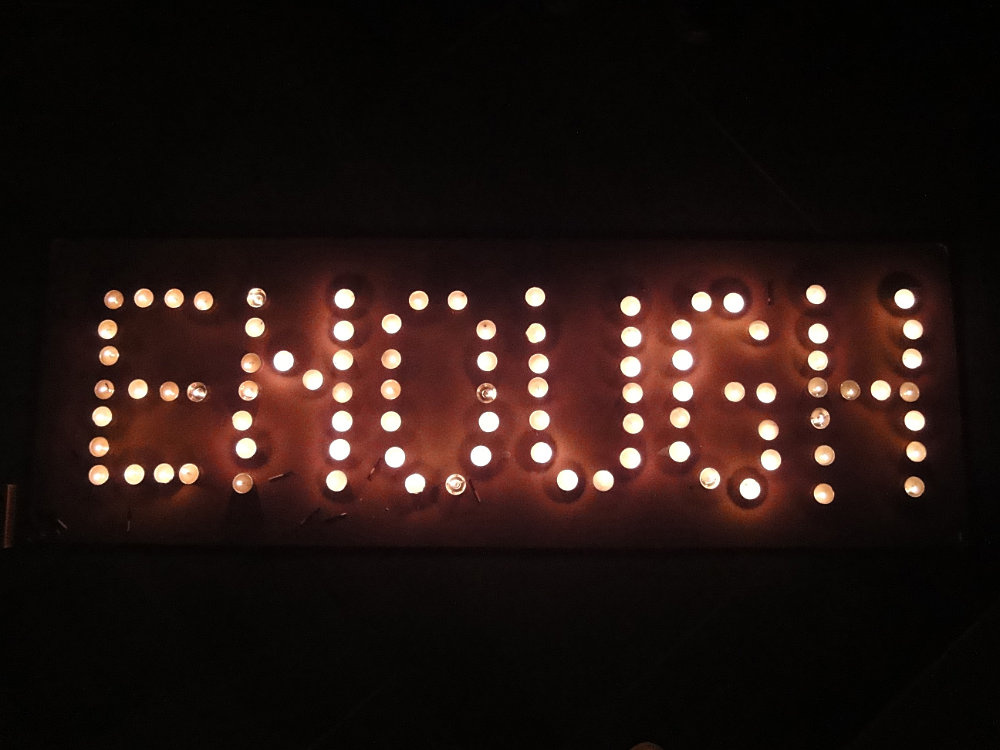October 2013: Enough
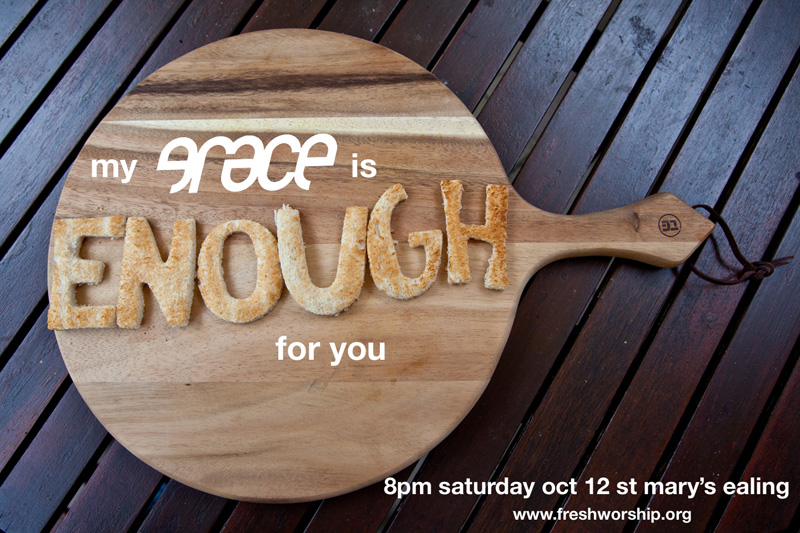
First – a welcome. Then, yeast, warm water, and sugar were mixed – to demonstrate, during the service, the leavening power of yeast.
Prayer:
As this yeast does its work,
So may the Holy Spirit infiltrate all of my life:
Those areas off-limits that I want to control.
Expand my experience,
Raise my expectations.
Becoming a source of nourishment to others,
even as crumbs on the floor.
We heard the story of Elijah in 1Kings 17 v 1-6: when there was famine in the land, and he was sent to the brook at Kerith, to be fed by the ravens.
Small pieces of dough, which had already gone through one kneading and rising, were given to the congregation. They were asked to shape the dough into small flatbreads, and to flavour them according to the season they felt they were in: if, like Elijah, they were in a season of famine, or of winter, then plain, or just salt; if they felt new beginnings in their lives, then seeds, for spring. For Summer – sugar and cinnamon; for Autumn, Za’tar herbs.
As they kneaded, they undertook a brief Examen, asking themselves the following questions:
When did I feel most alive today?
When did I most feel life draining out of me?
What is flourishing in my life?
What is desolate?
The flatbreads were taken away to rise and to be baked whilst the service continued.
Then we looked at 1Kings 17 7-16 (Elijah and the Widow of Zarephath):
A friend once told me the story of when she had to step out in front of the whole school to give a piano recital. She was chronically under-prepared and paralysed with fear. In the last few seconds she spent in the wings she told God and begged for a minor miracle. And then she stepped out onto the stage … and, well, it just happened. And the panic disappeared.
Was that God?
I ask because humans do seem to have extra reserves for when the petrol gauge turns yellow.
- The ‘brick wall’ that marathon runners say they hit
- The moment you sit in front of an exam paper it all comes to mind out of nowhere.
- The old ladies of 90 who lift up a Ford Mondeo to rescue their great grandchildren from underneath the wheels.
And it seems to be written into the story of God and his people.
The story of Moses leading his people through the desert with nothing in their backpacks.
When Jesus fed the five thousand in the desert he’s acting out the same story.
He’s pointing back to Moses.
And he’s pointing forwards too.
To the cross. Breaking on through to the other side.
And to our own lives.
To our last pinch of flour and oil
Those last couple of fish and loaves
For a while I lived with a very faith-filled couple. They told me of a time they had been living by faith and had nothing left in the larder. They’d spent the morning with a friend who had travelled over to see them. And they felt God say to them: “Invite him to stay for lunch.”
So they told him “We’ve not got much. But what we’ve got, you’re welcome to share.”
And he told the couple that he had been primed by God to provide them with a hearty lunch. Once they had invited him.
Which was nice…
So sometimes God leads us to the metaphorical brick wall.
When you’ve nothing left to give. Well, nearly nothing.
Think – what is your last pinch of flour and drop of olive oil.
Here’s a little ritual for you with oil and flour.
Invite God to remind you of when you had a ‘bread and oil’ moment…
When you thought you had nothing left to give. But you gave it anyway.
What were those last resources you let go from your hands?
- A last ten pounds
- A last reserve of emotional energy
- A last prayer
Or do you feel like that now?
Maybe you feel like you’ve got nothing left to contribute to the life of Grace?
Take a pinch of flour and feel it between your fingers. Think: ‘This is all I have left’
Think for a moment… what are those last, last, reserves you’ve got to offer to God?
Then drop the flour in the bowl. In your head, tell God “This is all I’ve got left. And it’s all yours, God”
Then go to one of the bowls with perfumed oil. Find someone to do this with: dip your finger into the bowl and cross the other person gently on the forehead. Remind them of God’s words “My grace is enough for you” as you do it.
When you’ve handed over your last reserves to God. Well, that’s when things get really interesting…
Continuing the story of Elijah, with 1 Kings 19 1-9:
Grace is entering its twentieth year next month. And for the year of Grace we have decided to revisit some themes we have explored before. Not just to repeat (it would be nice if Grace could bring itself to do so - but it’s not going to happen!) but to open up the theme and remix it I guess. Today’s is a remix of ‘bread’ which we have explored a few times. When we were planning this service we were very drawn this time round to this sequence of passages with Elijah in 1 Kings 17-19. We’ve looked at two parts of that story that feature bread. The third is rather long, so I’ll try and summarise it for you rather than read it all though do read it yourself. It contains a third instance of bread - read 19:3-8
Elijah is exhausted and depressed, on a downer. God addresses him by simply encouraging him to rest and sleep and to eat - how practical is that? He is actually having some kind of pity party it seems - when God asks what he is doing he has this rehearsed speech about how he is the only prophet left and they are trying to kill him. What’s curious about this is that earlier in the story he has bumped into the prophet Obadiah who tells him he has reserved 100 prophets who have not bowed to Baal so it’s not true - Elijah has lost perspective, and is catastrophising (being a drama queen). In a strange way pity is a kind of pride I think - it’s easy to do - I call it worm pride. It’s focussed on self just in a different way to puffing yourself up. But Elijah here does over-inflate his own importance. But God is saying ‘I have enough’. I have other prophets. I can run things ok.
This comes after Elijah’s showdown with the prophets of Baal on Mount Carmel. After the famine he has sent a message to Ahab that rain will come and challenged him to bring the prophets of Baal to Mount Carmel. Both they and he will create an altar and offer a sacrifice asking their God to send fire (and presumably rain). Elijah’s offering is consumed with fire and the prophets of Baal are killed. And rain comes in answer to Elijah’s prayer. You’d think he’d be on a high but actually we have probably all experienced after a high that it’s easy to lose perspective and experience a low. It’s a time to take care of yourself.
We have invoked the presence of the yeast of the kingdom, thought about the season we are in and prayed that God’s grace might be enough in our lives. As we talked about these stories in planning it began to dawn on us that this text might just resonate with us as a community, as Grace, as we enter our twentieth year. (If you are visiting do reflect on this in relation to your own community or own life. This isn’t meant to be too cliquey or internal!)
There’s something about this moment that we are in that seems important to begin to name. Last year was a hard year - we’re not sure why - it was hard getting our act together, people seemed knackered. The word ‘exhausted’ came up a few times...
We’re at a change point. Several people have left or are leaving - (not because they hate us!) So our resources are depleted somewhat - but we perhaps a little oil and flour is enough? I think too the environment has changed - Grace has had its Mount Carmel moments over the years, but there are many new things going on where the Spirit is at work and things have changed. We’re not the only one left - God has enough without us so we can relax about any sense of our own importance.
This is a naming moment - that’s all. But we want to invite us all to talk and pray and dream of what the way forward might be and how God might lead us. There is a curry evening? There is a meal and conversation evening? All are welcome to join in that. If you are on the edge and want to get more involved now is a good moment to do so! Next month is our 20th.
The word ENOUGH is spelled out in nightlights. I invite you to come and pray in response to what we have heard –
- pray to let go of your own and Grace’s own importance by praying that God will be at work in others communities and let go of your worm pride and catastrophising
- pray for those you know who are elsewhere including the friends of Grace I have mentioned
- pray for Grace as we seek God together into the future
And there are a couple of pillows and some chocolate and a prayer. If you are exhausted you are in good company - rest and eat.
(Play music, give space, light candles etc)
And the liturgy that pulls the whole thread together afterwards...
You made a wonderful world which contained the possibility of bread
with seeds, water, yeast, wheat and chemical reaction.
Your grace is enough
You led your people out of slavery in Egypt
and they made unleavened bread in haste for the journey ahead
Your grace is enough
You gave manna from heaven morning and night
to nourish your people in their wilderness years
Your grace is enough
You sent ravens with bread to Elijah the prophet
when famine ravaged the land
Your grace is enough
You ensured that the widow’s oil and flour never ran out
but kept making bread
Your grace is enough
You gave the prophet bread from angels
when he was exhausted and depressed
Your grace is enough
You said your kingdom is like yeast
that affects the whole batch of dough
Your grace is enough
You fed 4000 and 5000 people
with a few loaves and fish
Your grace is enough
You are the bread of life
whoever comes to you shall not hunger
Your grace is enough
You shared bread and wine with friends
a meal to remember you by
Your grace is enough
You will eat bread with us in your kingdom
when all things are made new
Your grace is enough
Today...
We entrust ourselves to you
We place Grace in your hands
We offer you our oil and flour knowing that
Your grace is enough and
Your power is made perfect in weakness. Amen
The risen yeast from the start of the service was shown, as a metaphor of God at work in the world.
The baked flatbreads that the congregation had prepared were brought in.
Prayer
God, food of the poor;
Christ our bread,
give us a taste of the tender bread
from your creation's table;
bread newly taken
from your heart's oven,
food that comforts and nourishes us.
A companionable loaf that makes us human
joined hand in hand,
working and sharing.
A warm loaf that makes us a family;
sacrament of your body,
your wounded people.
Then the flatbreads were shared as an Antidoron:
The Orthodox Church has two pulls going on inside it – one towards exclusivity and the other towards inclusivity. Eucharist is regarded very highly – only Orthodox believers who have fasted and prepared properly may receive it. But not all the loaf is consecrated: the largest portion is set aside as Blessed Bread, or Antidoron, to be shared among all the Orthodox. Churches that have a lot of non-Orthodox attendance have even-less-consecrated-Blessed-Bread which any Christian can share. I took part in this Blessed-Bread sharing at a service with a Russian Orthodox community in Bath. It was a beautiful experience. First the priest would break off a large lump of bread, break it in half, bless it with the words “May the blessing and the mercy of the Lord be with you” and share it with the person next to him. Then that person would eat a small fragment of it, break the rest in two, and themselves bless it: “May the blessing and the mercy of the Lord be with you” and share it with the people next to them. Before long the whole room was a melee of people blessing bread and sharing it.
We shared the bread using the words:
May the blessing and the mercy of the Lord be with you
Then we finished the service and went into the café to share the rest of the flatbreads.
Photos
<< swipe left

